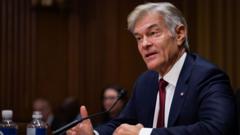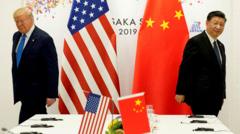Global stock markets have faced significant losses after President Donald Trump rolled out sweeping new tariffs expected to increase costs and hinder economic growth both domestically and internationally. The S&P 500, a benchmark for American companies, suffered a staggering 4.8% decline, marking its worst daily performance since the COVID-19 pandemic struck in 2020. Major consumer brands including Nike, Apple, and Target were adversely impacted, each witnessing share drops exceeding 9%.
Trump's Tariffs Cause Dramatic Downturn in Global Stocks

Trump's Tariffs Cause Dramatic Downturn in Global Stocks
Major financial markets experience their largest drops since the onset of COVID-19 following President Trump's announcement of new tariffs.
Earlier in the day, Trump defended his stance on tariffs, which target various imports with an initial 10% levy, asserting they would revitalize U.S. manufacturing and federal revenue. Moreover, countries like China, facing a total tariff of 54%, and the European Union, with a 20% duty, have promised retaliation against the U.S. 's aggressive trade strategies. The World Trade Organization expressed serious concerns regarding potential global trade contraction as traders brace for ongoing economic repercussions.
The steep decline in market values, roughly equivalent to $2 trillion, continues a trend of sell-off driven by trade war anxieties since mid-February. The Dow Jones and Nasdaq followed suit, decreasing by nearly 4% and 6%, respectively. Internationally, the UK's FTSE 100 also fell by 1.5%, generally reflecting bearish sentiment across global markets.
At a press conference, Trump reiterated his belief in the long-term success of his policy changes despite the negative impacts on stocks. "The markets are going to boom," he proclaimed, signaling potential negotiations if trade partners offer favorable concessions. However, analysts predict that these tariffs could exacerbate inflation and hinder growth, even potentially leading the U.S. toward recession without significant changes such as tax cuts.
As manufacturing sectors brace themselves for potential operational adjustments, companies are exploring whether to absorb the costs of tariffs, share them with partners, or pass the increased expenses onto consumers. The uncertainty surrounding consumer spending—which constitutes up to 15% of the global economy—raises concerns about broader financial implications.
Shares of companies like Stellantis, which announced temporary halts in production in response to the tariffs, indicate the unraveling effects of Trump's trade policy on employment and market dynamics. As shares of major retailers struggle, analysts warn of continued volatility in the markets as tensions rise and patterns of trade evolve in response to these tax changes.
The steep decline in market values, roughly equivalent to $2 trillion, continues a trend of sell-off driven by trade war anxieties since mid-February. The Dow Jones and Nasdaq followed suit, decreasing by nearly 4% and 6%, respectively. Internationally, the UK's FTSE 100 also fell by 1.5%, generally reflecting bearish sentiment across global markets.
At a press conference, Trump reiterated his belief in the long-term success of his policy changes despite the negative impacts on stocks. "The markets are going to boom," he proclaimed, signaling potential negotiations if trade partners offer favorable concessions. However, analysts predict that these tariffs could exacerbate inflation and hinder growth, even potentially leading the U.S. toward recession without significant changes such as tax cuts.
As manufacturing sectors brace themselves for potential operational adjustments, companies are exploring whether to absorb the costs of tariffs, share them with partners, or pass the increased expenses onto consumers. The uncertainty surrounding consumer spending—which constitutes up to 15% of the global economy—raises concerns about broader financial implications.
Shares of companies like Stellantis, which announced temporary halts in production in response to the tariffs, indicate the unraveling effects of Trump's trade policy on employment and market dynamics. As shares of major retailers struggle, analysts warn of continued volatility in the markets as tensions rise and patterns of trade evolve in response to these tax changes.






















